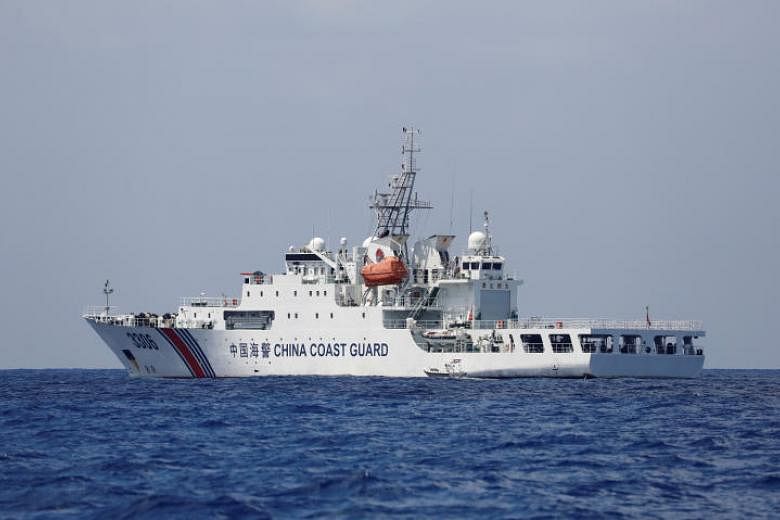MANILA (PHILIPPINE DAILY INQUIRER/ASIA NEWS NETWORK) - For ordinary fishermen and other Filipinos whose livelihoods are dependent on the peace and stability in the areas covering Scarborough Shoal and other parts within our exclusive economic zone, the long-overdue Code of Conduct (COC) being hammered out at the Association of Southeast Nations (Asean) is a crucial and indispensable component.
The discussion of the COC was inevitable during the recent 35th Asean summit in Thailand.
The COC is intended to manage conflicts, preserve peace and stability in the South China Sea, and prevent the use or threat of force while the merits of the dispute over the territories are under negotiation or arbitration.
President Duterte must continue to urge Asean to support its completion and approval at the soonest time possible.
Persistent Chinese aggression and military activities in the region continue to raise tensions with Asean countries Brunei, Malaysia, Indonesia, Philippines, Taiwan and Vietnam.
China still calls the shots at prime fishing spots and has even boosted its fleet in Scarborough Shoal despite the "friendly face" it offers the Philippines.
With the COC in place, situations like these are more likely to be avoided.
Last June, Mr Duterte expressed concern and disappointment over the delay in talks for forging the COC.
Given the urgency for it, Asean likewise should make it clear that it cannot afford to hear more rhetoric and broad strokes; expeditious action is needed to complete the COC as the welfare of the entire region is at stake.
The Philippines must also push for the full and effective implementation of the 2002 Declaration on the Conduct of Parties in the South China Sea.
This was Mr Duterte's fourth time to attend the Asean Summit, and again he failed to raise the matter of the Philippines' landmark arbitration victory against China over the South China Sea issue.
Current Philippine leaders have yet to use this victory to leverage and take a strong stand against Beijing's militarization of the area and uphold the rules-based international order in resolving the dispute.
Former foreign secretary Albert del Rosario has argued that the Hague ruling on the Philippines' case must be an integral part of any final COC draft. Our region cannot promote the rule of law while ignoring the law as it stands.
Asean needs to assert its leadership amid the geopolitical struggles and geostrategic shifts happening in its corners.
The group needs to rally its member nations to advance cooperation in the Indo-Pacific, and to continue as an honest broker within the strategic environment of competing interests.
Asean's failure to lead will allow an outside power to assert its economic and political hegemony, warned Del Rosario.
To this end, the fulfillment of the objectives of the Asean Outlook on the Indo-Pacific, which was jointly supported and signed by member states in June 2019, should be given focus.
The document seeks to: 1) guide cooperation; 2) promote peace, stability and prosperity while addressing common challenges, upholding the rules-based regional architecture and promoting closer economic cooperation, and thus strengthen confidence and trust; 3) enhance the Asean community's building process and strengthen existing Asean-led mechanisms, such as the East Asia Summit; and 4) implement existing Asean priority areas of cooperation, including joint maritime efforts, connectivity, economic progress, Sustainable Development Goals, and other areas of partnership.
The Asean Outlook was meant to contribute to the maintenance of peace, freedom and prosperity in the region.
It envisions the Asia-Pacific and Indian Ocean regions as a closely integrated and interconnected environment, with Asean playing a central and strategic role. It seeks to highlight dialogue and cooperation instead of rivalry, development and prosperity for all, and the importance of a maritime domain.
But the biggest challenge for Asean remains fast-tracking the completion of an effective and legally binding COC, to enable it to assert collective commitment and responsibility in enhancing regional peace, security and prosperity.
A louder, more robust stand on geopolitical and maritime issues will help demonstrate to the world that Asean is a solid bloc that will not allow itself to be bullied and bribed.
The writer is the founder and managing director of the Stratbase Group. The Philippine Daily Inquirer is a member of The Straits Times media partner Asia News Network, an alliance of 24 news media entities.

